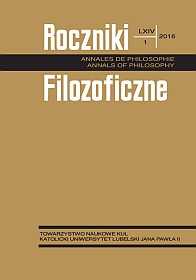Thomas Hobbes w interpretacji Lesliego Stephena a brytyjski agnostycyzm przełomu XIX i XX wieku
Abstrakt
Leslie Stephen, jeden z głównych przedstawicieli wiktoriańskiego agnostycyzmu i autor ważny dla wiktoriańskiej historiografii, wiele miejsca w swych dziełach poświęcił filozofii Thomasa Hobbesa, którego interpretował jako zdecydowanego sceptyka i którego myśl zainspirowała częściowo jego własną filozofię, szczególnie w przypadku takich zagadnień, jak rola religii i natura wiary. Analiza dokonanego przez Stephena porównania Hobbesa do Herberta Spencera ukazuje analogię między dwoma ujęciami problemu wiedzy o Bogu obecnymi w dziełach Hobbesa a formą, jaką problem ten przyjął u fideisty Henry’ego Longueville’a Mansela i agnostyka Herberta Spencera, rzucając światło na nowożytne inspiracje wiktoriańskiego agnostycyzmu i wpływ, jaki poglądy jego zwolenników wywarły na historiografię ich epoki.
Bibliografia
[Anon.] „The Theory of Belief: Dr. Newman and Mr. Leslie Stephen”. The Contemporary Review, 31 (1877): 869–873.
Aubrey, John. „Thomas Hobbes (1588-1679)”. W: ‘Brief Lives,’ chiefly of Contemporaries, set down by John Aubrey, between the Years 1669 & 1696, red. Andrew Clark, vol. 1, 321–395. Oxford: Clarendon Press, 1898.
Bicknell, John W. „Leslie Stephen’s English Thought in the Eighteenth Century: A Tract for the Times. Victorian Studies 6 (1962), 2: 103–120.
Curley, Edwin. „‘I Durst Not Write So Boldly’”. W: Hobbes e Spinoza. Scienza e politica, red. Daniela Bostrenghi, 497–593. Napoli: Bibliopolis, 1992.
Descartes, René. Medytacje o pierwszej filozofii, przeł. Maria Ajdukiewicz, Kazimierz Ajdukiewicz, Stefan Swieżawski, Izydora Dąmbska. Kęty: Wydawnictwo Antyk, 2001.
Gorham, Geoffrey. „The Theological Foundation of Hobbesian Physics: A Defence of Corporeal God”. British Journal for the History of Philosophy 21 (2013), 2: 240-261. DOI: 10.1080/ 09608788.2012.692663.
Lightman, Bernard. The Origins of Agnosticism: Victorian Unbelief and the Limits of Knowledge. Baltimore – London: The Johns Hopkins University Press, 1987.
Mansel, Henry Longueville. The Limits of Religious Thought. Boston: Gould and Lincoln, 1860.
Maurice, Frederick Denison. Moral and Metaphysical Philosophy, vol. 2. London – New York: Macmillan and Co., 1890.
The English Works of Thomas Hobbes of Malmesbury, red. William Molesworth. London: John Bohn, vol. 1 – 1839, vol. 3 – 1839, vol. 4 – 1840.
Robertson, George Croom. Hobbes. Edinburgh – London: William Blackwood and Sons, 1905 (data pierwszego wydania: 1886).
Spencer, Herbert. First Principles. London: Watts & Co., 1900.
Springborg, Patricia. „Hobbes’s Challenge to Descartes, Bramhall and Boyle: A Corporeal God”. British Journal for the History of Philosophy 20 (2012), 5: 903-934. DOI: 10.1080/09608788. 2012.718606.
Stephen, James Fitzjames. Horae Sabbaticae. London – New York: Macmillan and Co., 1892.
Stephen, Leslie. An Agnostic’s Apology and Other Essays. New York – London: G. P. Putnam’s Sons – Smith, Elder & Co., 1903.
Stephen, Leslie. Essays on Freethinking and Plainspeaking. New York – London: G. P. Putnam’s Sons – The Knickerbocker Press, 1905.
Stephen, Leslie. History of English Thought in the Eighteenth Century, vol. 1 i 2. London: Smith, Elder & Co., 1876.
Stephen, Leslie. Hobbes. London: Macmillan and Co., 1928.
Stephen, Leslie. Hours in a Library. London: Smith, Elder & Co., 1881.
Stephen, Leslie. Studies of a Biographer, vol. 1, 3 i 4. London: Smith, Elder and Co. – Duckworth and Co., 1907.
Stephen, Leslie. The Life of Sir James Fitzjames Stephen, Bart., a Judge of the High Court of Justice. London: Smith, Elder & Co., 1895.
Stephen, Leslie. The English Utilitarians. London: Duckworth and Co., vol. 1 – 1912, vol. 2 – 1900.
Tönnies, Ferdinand. Hobbes and Spinoza. W: Tenże. On Social Ideas and Ideologies. New York – Evanston – San Francisco – London: Harper & Row, Publishers, 1974.
Copyright (c) 2016 Roczniki Filozoficzne

Utwór dostępny jest na licencji Creative Commons Uznanie autorstwa – Użycie niekomercyjne – Bez utworów zależnych 4.0 Międzynarodowe.





